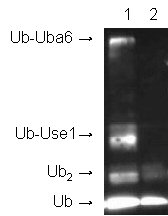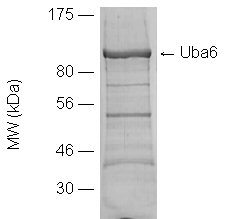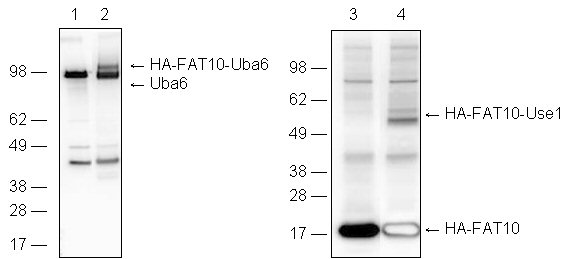UBA6 (ubiquitin-like modifier activating enzyme-6, also known as UbE1L2) is a novel ubiquitin activating enzyme that is also capable of activating the ubiquitin-like protein FAT10 (human leukocyte antigen F-associated transcript 10), which, similarly to ubiquitin, may serve as a signal for proteasomal degradation.
UBA6 exhibits 42% homology to the major ubiquitin activating enzyme UbE1 and contains all the key structural elements required for E1 enzyme activity. It has been shown to interact with a number of E2 and E3 enzymes, facilitating transfer of ubiquitin to substrate proteins such as p53 in vitro. Only one UBA6 specific E2 conjugating enzyme, known as Use1 or UbE2Z, which is capable of accepting activated FAT10, has been identified to date.
FAT10, is encoded by the major histocompatibility (MHC) class I locus, and its expression is induced by tumor necrosis factor α (TNFα) and interferon-γ (IFNγ). FAT10 is highly upregulated in hepatocellular carcinoma as well as in other gastrointestinal and gynecological cancers, though its precise biochemical and cellular functions have yet to be determined.
FAT10 forms covalent conjugates with cellular proteins through its C-terminal diglycine motif, though substrates have yet to be identified. Knockdown of Uba6 results in strong, but not complete diminution of FAT10 conjugation, an effect not observed with knockdown of UbE1. This finding indicates that Uba6 is both necessary and sufficient to activate FAT10 and thereby facilitate its conjugation.
Shipping: Available products typically ship within 24/48h, via priority shipping.
Do you need support? Contact Customer Service or Technical Support.
Online Account
Access or Create Your Account
| Regulatory Status |
RUO – Research Use Only |
|---|
Last modified: May 29, 2024
 Lab Essentials
Lab Essentials AMPIVIEW® RNA probes
AMPIVIEW® RNA probes Enabling Your Projects
Enabling Your Projects  GMP Services
GMP Services Bulk Solutions
Bulk Solutions Research Travel Grant
Research Travel Grant Have You Published Using an Enzo Product?
Have You Published Using an Enzo Product?



